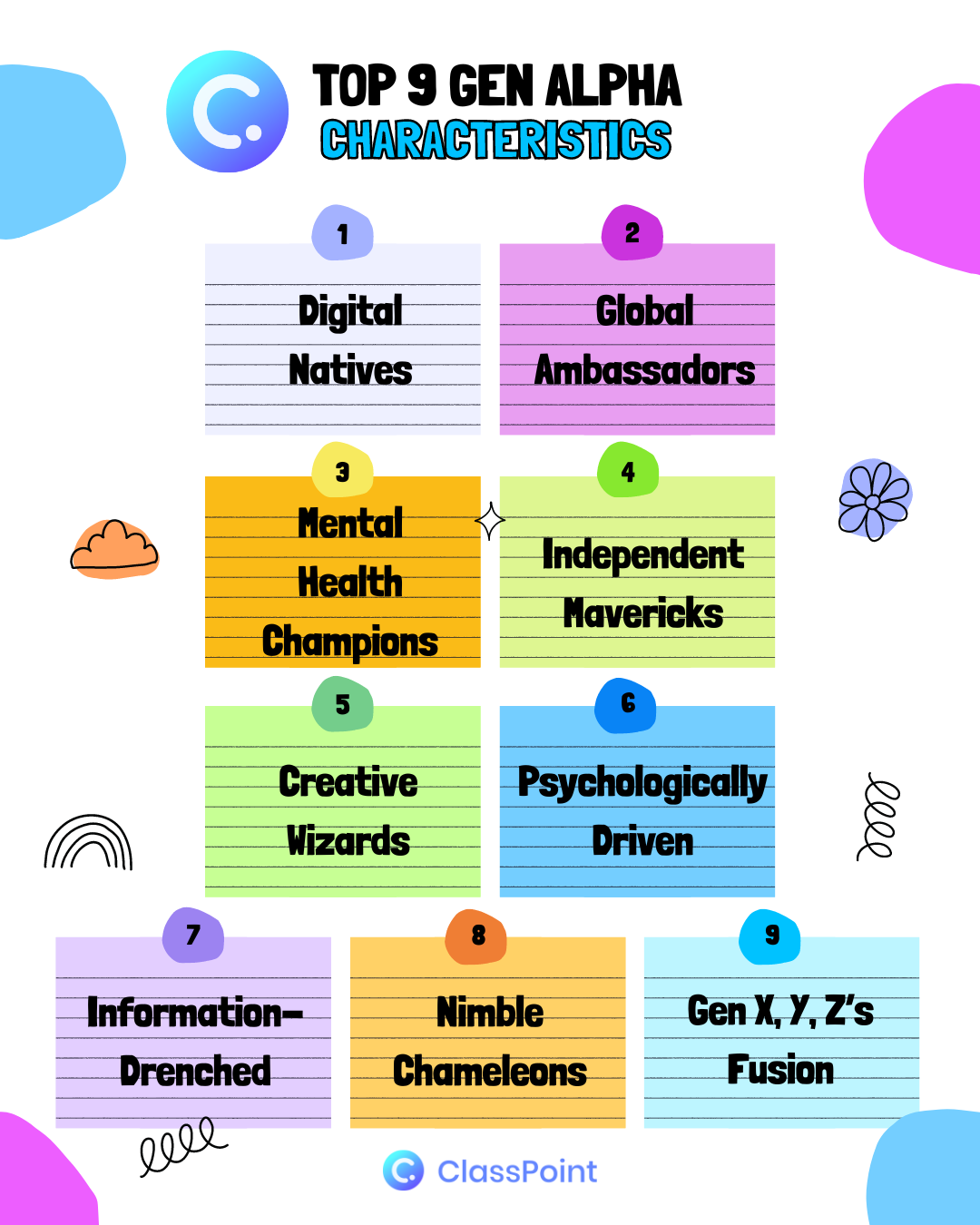“Are you being a delulu?”
“Your presentation totally ate, teacher!”
Each generation has their own unique slangs and characteristics, gen alpha included. Gen alpha characteristics reflect their upbringing in a digitally immersive world where they are not just tech-savvy, they’re “woke” to global issues and socially conscious beyond their years.
Classrooms today are populated with a generation of young minds that is exceedingly more tech-savvy, open-minded, inclusive and adaptive from the previous generations.
What are the best ways to engage with them so that you can slay in front of your classroom?
Read on to find out!
Who is Gen Alpha?
Comprising of more than 2.8 million people, Generation Alpha succeeded Generation Z. They are individuals born from 2012 to 2024 and are predominantly the offspring of Millennials, born between 1981 and 1996.
The term “Generation Alpha” was coined in 2005 by demographer Mark McCrindle, founder of the Australian consultancy firm McCrindle. They are called gen alpha because:
In keeping with this scientific naming of using the Greek alphabet in lieu of the Latin, and having worked our way through Generations X, Y and Z, we settled on the next cohort being Generation Alpha – not a return to the old, but the start of something new. This made a lot of sense as Generation Alpha represented the first generation to be born entirely in a new century.
Mark McCrindle

1. They’re digital natives
Gen Alpha, like their Gen Z predecessors, are born into a world where screens with four edges are their go-to for information and entertainment. They’re true digital natives, navigating a universe where tech is woven into every facet of their learning and playtime.

Statistics reveal that on average, children aged 8 to 12 spend approximately 4 hours and 44 minutes in front of screens, while teenagers aged 13 to 18 spend about 7 hours and 22 minutes engaged with screens. And according to this study, this is about 3 hours more than millennials (average 205 minutes screen time a day), and 4-5 hours more than Gen X and Boomers (average 169 minutes and 136 minutes a day). Yet, Gen Alpha’s screen affinity doesn’t eclipse their outdoor aspirations. Surprisingly, statistics show that 46 percent of them aspire to pursue careers that allow them to embrace the great outdoors.
How to Engage Digital Natives in Class?
- Adapt teaching methods to leverage digital tools and resources effectively – Recognize that these students have grown up surrounded by technology, digital tools and platforms as an integral part of their lives. Be open to incorporate edtech tools and AI into teaching.
- Interactive learning experience is a must – Being digital natives also mean that this generation has shorter attention span. Create engaging, interactive learning experiences that involves quizzes and interactive whiteboard.
- Counter short attention span with microlearning – Microlearning apps enable bite-sized learning that can be as effective as traditional longer-form courses when they allow new information to be digested on-the-go.
- Incorporate VR and AR in classroom teaching – Virtual reality and augmented reality technologies are no longer far-fetched ideas, but a reality. These tools have the potential to foster a deeper understanding of complex concepts, ignite student curiosity, and promote innovative learning.
Incorporate AI in Education seamlessly with this guide!
2. They’re global ambassadors
When we say Gen Alphas are global ambassadors – we really mean it. Raised in an interconnected world, they naturally embrace cultural diversity and are keenly aware of global challenges such as climate change, social justice and human rights. Their upbringing in a digital milieu provides them with unprecedented access to information and perspectives from around the globe, making them the most diverse and inclusive generation in history. They’re the ones who would talk about climate change and human rights at the dinner table.

Statistics don’t lie – Over 30% of Gen Alphas express a desire to make a positive impact by dedicating their futures to helping people or the planet. Following closely behind, nearly 15% aspire to transform their hobbies into careers. And this study shows a staggering 96% of Generation Alpha members aged 7-9 believe in fair treatment for everyone, regardless of their appearance. Furthermore, an impressive 66% of Generation Alpha shows a strong inclination towards supporting companies that have a positive impact on the world.
How to Engage Global Ambassadors in Class?
- Build a culturally responsive classroom – Encourage gen alpha students to think beyond borders, appreciate different perspectives from students of other backgrounds.
- Leverage on global awareness projects – teach with the end goal to spur critical thinking on global issues and actions on global challenges—whether it’s through school projects or online activism.
3. They’re mental health champions
Growing up in a highly competitive and achievement-oriented era, gen alpha naturally emerges as mental health champions, recognizing the importance of emotional well-being from an early age. Statistics reveal that 59% agree that mental health is a significant issue, while 62% believe their schools should prioritize mental health education over physical education.

However, this does not mean that gen alphas are the most mentally healthy or emotionally resilient generation. This study shows that currently, approximately one in four adolescents meets the criteria for having a serious mental illness. Data indicates a more than 20% increase in adolescents meeting this criteria over the last five years. While gen alphas can be like little therapists in training, recognizing the importance of mental well-being, it is also worth reminding that they are young minds that need our attention and care.
How to Engage Mental Health Champions in Class?
- Teach mental health strategies – Integrate mindfulness practices, emotional regulation techniques, and inclusive mental health education into the curriculum, educators can empower gen alpha to prioritize their mental health, prevent burnout and stay resilient in a fast-paced world.
- Build a social emotional learning curriculum – Incorporate social emotional learning into the curriculum to encourage gen alpha to support their peers in times of need.
- Create a classroom culture where empathy is king – It’s about empowering gen alpha to be emotionally intelligent leaders who lift each other up in good times and bad.
4. They’re independent mavericks

Generation Alpha exhibits high levels of independence. From an early age, they demonstrate a strong sense of autonomy and a preference for making their own decisions. Whether it’s starting a YouTube channel or building crazy Lego creations, they’re all about exploring and figuring things out for themselves. Raised by parents who value free expression and autonomy, it is no surprise that gen alpha embraces a spirit of self-reliance and individuality
How to Engage Independent Mavericks in Class?
- Schedule independent learning time – Educators can nurture their independence by providing opportunities for hands-on learning, project-based assignments, and entrepreneurial challenges to empower gen alpha to explore their interests and take initiative.
- Personalized teaching – Teach using differentiated instruction strategies to promote personalized learning and space for them to take the lead in their own learning journey.
5. They’re entrepreneurial and creative wizards

Gen Alpha isn’t just glued to screens; they’re also cooking up ideas and dreaming big. From designing their own apps to reimagining how things work, they’re natural-born innovators. Growing up in a digital age that rewards creativity and innovation, they are adept at leveraging technology to bring their ideas to life. As “mini-millennials”, gen alpha children share some of their parents’ traits and spirit of entrepreneurialism.
Research indicates that Generation Alpha’s expectations for the workforce diverge significantly from current norms, with more than three quarters (76%) aspiring to be their own boss or engage in a ‘side hustle’, compared to only 13% who prefer traditional employment under someone else. This shift reflects their inclination towards entrepreneurship, independence, and the pursuit of diverse professional endeavors beyond conventional career paths.
How to Engage Gen Alpha in Class?
- Incorporate higher-order thinking in classroom teaching – Develop gen alpha’s problem-solving, design thinking, collaboration, and critical thinking help equip them with the skills they need to become future innovators and leaders in their chosen fields. Incorporating Blooms’ Taxonomy in the classroom teaching routine is a good start.
- Projects that encourage creative thinking – Ditch traditional assignments and include projects that encourage students to think outside the box and turn their ideas into reality as part of the classroom assignments.
Try ClassPoint AI quiz generator that allows you to generate endless Bloom's Taxonomy quiz questions based on your teaching slides!
6. They’re emotionally and psychologically driven

With social media algorithms steering the individual decisions and actions gen alpha takes, this generation is motivated by quantifiable measures including likes, scores and rankings. Punitive and disciplinary measures do not as well as compared to motivational speeches, gamification and interactive content that cater to their preferences. This dynamic reflects Generation Alpha’s digital fluency and their expectation for personalized, interactive experiences that enhance motivation and engagement.
How to Engage Gen Alpha in Class?
- Add gamification into the classroom – Gamifying the classroom needs not be like solving a complex mathematical equation. Help you students learn through earning stars, levels and badges, and maintain a healthy competitive spirit in the classroom with a seamless leaderboard.
- Teach using game-based learning – Incorporating games into classroom teaching not only help you raise engagement level, but also promotes success and even higher level of absorption.
- Try positive reinforcement – Behavioural learning is effective especially for the younger crowd. Reward desirable classroom behaviours with praise of rewards to make classroom management less of a roller coaster and more of a smooth sailing journey.
Incorporate popular American game show-inspired games like Family Feud, Wheel of Fortune and Jeopardy in the classroom!
7. They’re data and information-drenched

Generation Alpha is immersed in a world saturated with data, where information is readily accessible and abundant. Their feed is saturated with constant stream of content tailored to their preferences and interests. This inundation of data and information shapes their understanding of the world from a young age, fostering a familiarity with digital tools and an expectation for instant access to information.
How to Engage Gen Alpha in Class?
- Teach critical thinking – Information is abundant on the web, but skills to identify misinformation and navigate complex information critically is lacking. A teacher’s role is to teach gen alpha to navigate the sea of information, think critically about what they find online, and use data to make smart decisions.
- Practice digital detox once in a while – It is also crucial to teach gen alpha the importance of detaching from digital tools and platforms from time to time, to help them build real connections with themselves and people around them. Here’s how to excel in interactive teaching without student devices!
- Blend online teaching with offline teaching – Explore non-traditional teaching methods like blended learning, hybrid learning and flipped classroom, that can keep gen alpha engaged and active in learning.
8. They’re nimble chameleon

Gen Alpha isn’t afraid of change; they thrive on it. Having lived through a global pandemic at a young age, gen alpha demonstrates a remarkable ability to adapt and thrive in an ever-changing world. They are flexible in their approach to learning, adept at embracing new technologies, and resilient in the face of challenges. They are exposed to a variety of digital tools and platforms from a young age, which encourages them to quickly learn and adapt to new technologies. Moreover, they are raised in a globalized world where diversity and cultural exchange are prevalent, fostering their ability to navigate and embrace different perspectives and situations with ease.
How to Engage Gen Alpha in Class?
- Switch up teaching methods – Regardless of your teaching styles, it is important to create flexible learning environments by switching up your teaching pedagogies to empower your gen alpha students to be agile thinkers who can innovate and succeed no matter what comes their way.
- Teaching methods that work best for gen alpha – Harkness methods, inquiry-based learning, cognitive learning.
Try these 21st century classroom teaching pedagogies tailored towards modern educators.
9. They’re a combination of Gen X, Y and Z!

All in all, gen alpha represents a unique blend of characteristics from previous generations, combining the independent spirit of Gen X, the digital fluency and entrepreneurial spirit of Gen Y (Millennials), and the socially conscious mindset of Gen Z. They’re the ultimate blend of old-school cool and new-school smarts, shaping their own identity in a fast-paced world.
How to Engage Gen Alpha in Class?
- Build a balanced and multifaceted teaching environment – While gen alpha is a social media generation, TikTok dance is not the only way to engage with them. It is important for educators to appreciate their unique traits, but at the same time acknowledge that gen alpha can inherit various timeless values and traits from previous generations, such as diligence, perseverance, critical thinking, and entrepreneurial mindset. By creating a balanced learning environment that blends modern technology with foundational teaching principles, educators can effectively engage and empower Gen Alpha to thrive academically and socially.
Gen alpha years
Gen Alphas are individuals born from 2012 to 2024, and are currently aged 14 or younger.
Gen Z vs Gen Alpha characteristics
Generation Z, born between 1997 and 2012, is known for its digital fluency and social media savviness. Like Gen Z, they grow up amidst the rise of smartphones and social platforms.
However, gen alpha, born between 2012 and 2024, inherits these traits but with an even deeper immersion in technology from birth. They are characterized by a heightened digital dependency, earlier exposure to advanced tech like AI, VR and AR, and a growing emphasis on diversity, inclusivity, mental health and wellbeing, as well as sustainability and global interconnectedness.
Gen alpha characteristics in the workplace
Gen alpha is yet to enter the workplace, but it is never too early to be prepared for what to expect of them. Their upbringing in a tech-saturated world suggests they will bring unparalleled digital fluency and adaptability to future jobs.
As such, it is predicted that 2 out of 3 gen alphas will work in industries and jobs that are yet to exist today. Educators and employers should anticipate their preference for flexible work environments, entrepreneurial culture, innovative problem-solving skills honed through digital play, and a natural inclination towards leveraging technology for productivity and creativity.
What’s the Future Outlook of Gen Alpha?
- Highly Tech-Integrated: Gen alpha is expected to be deeply immersed in advanced technologies like AI, VR, and augmented reality, in school or workplace.
- Global Connectivity: Gen alpha is likely to be more committed in their contribution to global causes and movements due to their upbringing in a digitally interconnected world.
- Entrepreneurial Spirit: With a strong emphasis on creativity and innovation, gen alpha is anticipated to drive entrepreneurial ventures and startup culture to a whole new horizon.
- Environmental Focus: Gen alpha’s growing awareness surrounding sustainability issues, we can expect these issues playing a greater role in shaping consumer behavior and career choices.
- Adaptability and Resilience: Prepared to navigate rapid societal and technological changes, gen alpha is more than ready to leverage their adaptable nature and digital fluency to deal with challenges in life and at work.
Final Thoughts
As educators gear up to engage Gen Alpha, it’s clear these digital natives bring more than just TikTok dances to the classroom. From their innate tech-savviness to their global consciousness, Gen Alpha is shaping up to be a dynamic cohort. Embracing their “woke” mentality and knack for technology, educators can harness these traits to foster a classroom environment that prepares them for a future filled with flexibility, innovation and creativity. So, let’s be a stan for Gen Alpha and empower them to thrive in a world where change is not just “extra” but essential!
